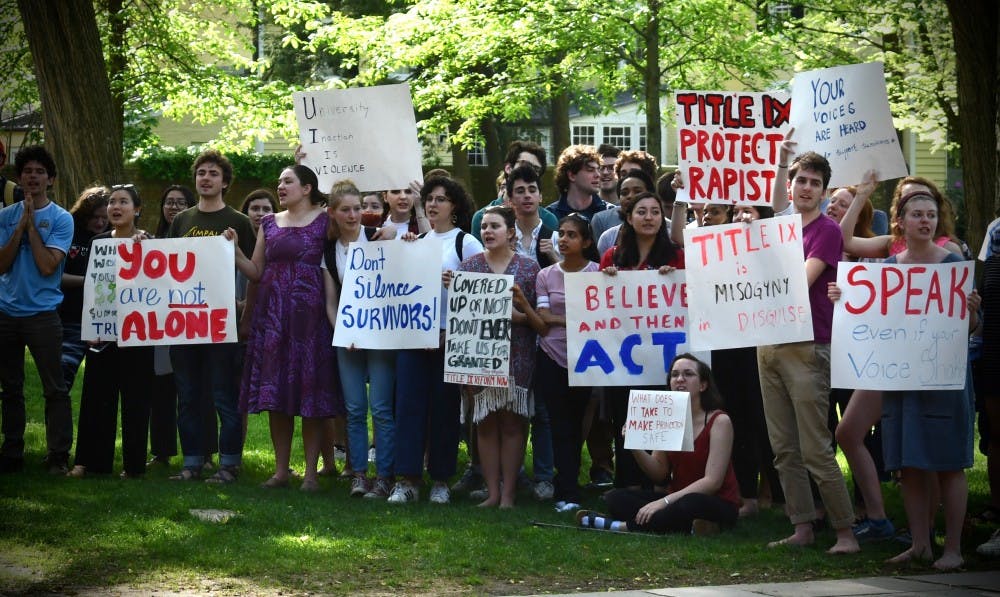Princeton Students for Title IX Reform (PIXR) is a coalition of students working to reform Princeton’s implementation of Title IX and approach to campus sexual misconduct.
Right now, we are in the middle of a global crisis with extreme and differential impacts on students. Instead of addressing the inequities and burdens of online learning, the destabilizing effect of lost income or housing, or the trauma of a public health crisis, Betsy DeVos has devoted the Department of Education’s energy to making the Title IX process more difficult for survivors.
This appalling use of the Department’s time and resources shows a blatant disregard for the welfare of students and the stresses they are under. The University must do what it can within these regulations to establish accountability for its students and its own conduct and respect due process while also respecting the extreme obstacles survivors face.
Most importantly, the University must increase its investment in ways to prevent violence and support survivors outside of the Title IX system. These investments must consider and prioritize students who are at increased risk of violence, and for whom existing networks of support are not always tailored because of intersecting racial, ethnic, religious, gender, sexual, ability, and class identities.
To this end, we recommend that the University increases funding to campus community centers to allow them to better support these students, including: the Carl A. Fields Center for Equality and Cultural Understanding, the LGBT Center, the Women*s Center, and the AccessAbility Center.
Moreover, we again call for increased funding for Counseling and Psychological Services (CPS) and Sexual Harassment/Assault Advising, Resources, and Education (SHARE) to expand trauma-informed support for students, with an emphasis on developing resources with an intersectional framework in mind to make these services accessible for all students. The new Title IX regulations will only increase students’ distress — our community needs adequate resources to support survivors now more than ever.
The regulations:
The regulations are spelled out in a complex 2000 page document, which PIXR is currently reviewing, but reputable news outlets have already summarized the regulations’ key features. While the regulations announced today are less extreme than initial drafts suggested, they introduce dangerous policies that fail survivors.
Although DeVos may claim that these regulations will protect due process for the accused, many of these new regulations are clearly aimed at silencing survivors and allowing schools and universities to sweep sexual misconduct under the rug. Collectively, these types of regulations work to discourage students from reporting violence, reduce findings of responsibility for those who commit misconduct, and increase the culture of impunity for both abusers and institutions alike. For example:
- The regulations unrealistically narrow the definition of sexual harassment, stating that abuse must be considered so “severe, pervasive, and objectively offensive” to a “reasonable person” that the victim loses equal access to education. The stringent and subjective standard was adopted to protect “free speech,” so that verbal harassment that is racist, transphobic, homophobic, or sexist in nature is not inherently considered harassment and cannot be investigated until the institution decides that it is bad enough. Estimations of how “pervasive” harassment is will likely center on the actions of the victim, putting victims in the strange position of being incentivized to leave classes, organizations, or learning environments to “prove” the harassment was so bad they couldn’t continue their studies.
- The regulations do not allow schools to investigate abuses that occur during university-sponsored study abroad programs, creating an atmosphere of impunity for abusers in those contexts. This is especially harmful because students are often not familiar with, do not want to, or cannot safely navigate criminal justice systems in other countries — leaving survivors abroad with nowhere to turn.
- Coaches and athletic trainers will no longer be required to report instances of sexual misconduct. We believe athletic staff must be held to the same standard as other University employees when it comes to reporting misconduct. Otherwise, an impression will be created that what happens on the field stays on the field, where athletes, coaches, and doctors can operate with impunity and universities can look the other way to avoid losing revenue or reputation.
- The regulations make it significantly more difficult for survivors to sue universities for failing to address misconduct.
However, because universities have some flexibility in the way they respond to the new regulations, the University still has the chance to mitigate the most damaging parts of these regulations and can do so in the following ways:
- The University must maintain the current burden of proof in Title IX cases. Currently, to find someone responsible for misconduct hearings must establish a “preponderance of the evidence” that they committed misconduct. This burden, which means “more likely than not,” is standard in most types of civil cases and not unique to Title IX. The new Title IX regulations allow universities to raise the evidentiary standard to “clear and convincing” evidence of misconduct. While some cases might meet a higher burden, it is necessary to maintain the current burden of proof because there may not always be physical evidence in cases involving sexual misconduct as survivors are not always able to safely obtain or provide such evidence.
- The new regulations give universities the power to decide whether to hold a mediated process or an adversarial investigation when misconduct is alleged — that is, universities can decide whether to pursue mediation, or punish someone found responsible with probation, suspension, etc. Forcing complainants to choose between nothing and a mediated process with their abuser is inhumane and unsafe — but some complainants would welcome a mediated process. Therefore, we urge the University to give complainants the choice as to which path to pursue, rather than decide for them.
- The new regulations require that both complainants and respondents are cross-examined by lawyers, university employees, or other persons. This will obviously retraumatize survivors and discourage reports of abuse. It also means inequalities between complainants and respondents will be exacerbated. If one student has greater material resources, they would be able to hire outside counsel to represent them in an investigation, while the other student could be left with a University administrator with mere hours of training to represent them. Given the unjust eventualities, we recommend that the University provide adequate legal resources to students to ensure equity. One such solution could be the implementation of social workers, one of the reforms proposed by PIXR during our protest last spring. At other universities, such as University of Michigan and Marquette University, students are provided advocates to help them navigate the confusing and traumatizing process of making a complaint. While there are currently “Title IX Advisers” at the University, they are not permitted to serve as advocates, and helping claimants is not their full-time job. The social workers we propose should have the legal training and background necessary to reasonably advocate for those engaged in the Title IX process. A full explanation of our proposed social worker position, along with the rest of our reforms, can be found on our website.
- The new regulations expand the role of the Title IX administrators, providing opportunities for more staff and requiring the support of survivors who never make a complaint. The University should take this opportunity to consider PIXR’s critique of the current system, where insufficient support lets survivors fall through the cracks and results in misinformation, and use this new regulation to solve this problem.

PIXR recognizes that the complex new regulations must be fully dissected by trained legal professionals, and students involved will seek such expertise as we learn more and develop an official response to the entirety of the new regulations. In the meantime, we urge the University to do what it can to stand up for survivors and resist regulations that will discourage reporting and increase impunity for abuse.
Still, the University’s approach to sexual violence cannot begin and end with Title IX. These shortcomings are all the more reason why the administration needs to work to 1) prevent violence from happening in the first place and 2) support survivors outside of the Title IX process.
The University can prevent violence by tackling destructive campus norms, through improving and expanding student, faculty, and staff training and by investing in education around violence, gender, and intersecting systems of abuse via increased funding to the Gender and Sexuality Studies program. The University can support survivors better by increasing access to trauma-informed counseling.
In particular, the University must provide resources that address the needs of different communities — especially since marginalized groups like black women, brown women, and LGBT-identifying students experience violence at much higher rates nationally. The University should immediately implement the recommendations of its own Joint Committee on Sexual Misconduct, which proposed a series of reforms this October that by and large have yet to be implemented.
Although the COVID-19 crisis has harmed our community deeply, it also presents an opportunity for the University to expand programming and prepare while students are off campus. When they return, as before, they will face a pandemic of violence that impacts roughly 12-15 percent of all students each year — women are disproportionately affected, and transgender and gender non-conforming students experience sexual violence at quadruple the rate of their peers. Harms to survivors will only be intensified under the Department of Education’s new regulations.
In solidarity,
Princeton Students for Title IX Reform
Tori Gorton ’21, vgorton@princeton.edu
Maya Aronoff GS, ’19, maronoff@princeton.edu
Aisha Tahir ’21, atahir@princeton.edu
KiKi Gilbert ’21, kiarag@princeton.edu
Amna Amin ’21, amnaa@princeton.edu
K Stiefel ’20, kstiefel@princeton.edu
The views expressed in this article are those of PIXR as a movement. The authors do not claim to speak for all survivors of sexual misconduct. Those interested in learning more may contact princetonixnow@gmail.com.








